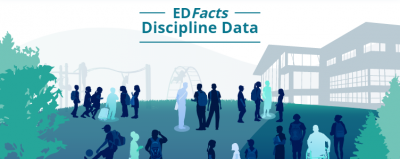Site Search
Results 8 - 14 of 18
-
CADRE's 9th National Symposium - Planting Seeds: Growing an Inclusive and Informed CommunityCADRE will convene its 9th National Symposium on Dispute Resolution in Special Education, Planting Seeds: Growing an Inclusive and Informed Community, October 26-28, 2022. The event will take place in Denver, Colorado. Symposium participants will include Office of Special Education Programs (OSEP) staff, state dispute resolution coordinators, directors of special education, dispute resolution practitioners, researchers, parent advocates, attorneys, educators, service providers, and parents.
Format: Applications and Spreadsheets
EDFacts IDEA Discipline Data InfographicThe EDFacts IDEA Discipline Data Infographic provides basic information about the EDFacts file specifications states use to submit IDEA Discipline data to the U.S. Department of Education. The infographic outlines details about Discipline data for children and youth with disabilities ages 3 through 21 that states must include in their annual submission of EDFacts files FS005, FS006, FS007, FS088, FS143, and FS144.
Format: Trainings
ii20 Session Presentations and HandoutsThe Interactive Institutes 2020 – Building and Sustaining a Culture of High-Quality Data provided opportunities for participants to take a deep dive into data quality topics to learn about data culture change. Participants were able to discover best practices to improve data collection, reporting, analysis, and use. They also engaged with peers and TA providers about trending data quality topics. Each session presented powerful ideas and actionable plans to improve work processes and data quality.
Format: Applications and Spreadsheets
Coordinated Early Intervening Services (CEIS) Fiscal and Student Data TrackerThe Coordinated Early Intervening Services (CEIS) Fiscal and Student Data Tracker is a set of four tools SEAs can use with their districts, schools, and providers to assist them in tracking the finances, services, and student data associated with CEIS. IDC and CIFR produced the CEIS Tracker. The resource also includes an instructions document or user's guide for more information about when and how to use the CEIS Tracker.
Format: Guides and Briefs
Success Gaps Rubric: Addressing Equity, Inclusion, and OpportunityThis rubric allows a team of users from a district or school to systematically examine the root causes of success gaps among groups of students by focusing on equity, inclusion, and opportunity. The recently updated rubric now includes considerations for children as young as preschool age. A complementary white paper provided the research-based background that supported development of the rubric.
Format: Applications and Spreadsheets
Equity Requirements in IDEAThis resource compares the three equity requirements in IDEA (disproportionate representation, significant discrepancy, and significant disproportionality) across various elements to explain the similarities and the differences among the requirements.
Format: Toolkits
Success Gaps Toolkit: Addressing Equity, Inclusion, and OpportunityThe Success Gaps Toolkit presents a process for using data and the Success Gap Rubric to identify root causes of gaps between groups of children in districts or schools. These success gaps occur when the education system is not meeting the needs of all groups of children and outcomes for some groups are different than outcomes for most groups. The toolkit, with its process and materials, provides a manageable and defined way for districts or schools to identify success gaps that are present and their root causes and then make a plan for addressing the gaps. The success gaps may be the graduation rate of students who are English learners compared to the rate of all other children, the out-of-school suspension rate of children who are Black compared to the rate of all other children, the identification of children who are Hispanic as children with specific learning disabilities compared to the identification of all other children, and other gaps.







